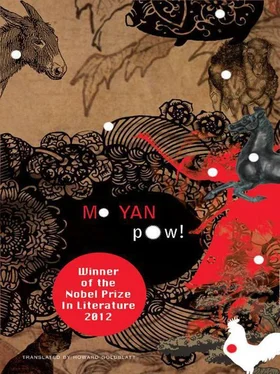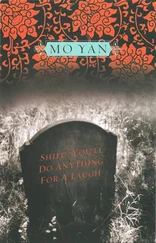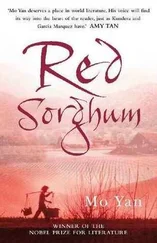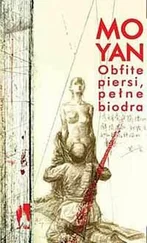Squeals of pigs in their death throes spread throughout the village—the slaughter had begun. The air was redolent with the aroma of barbecued meat. Now that we were loaded and ready to go, Mother reached under the seat and took out the crank handle, which she fitted into the cross-hair opening; then she took a deep breath, bent down, spread her legs and turned with all her might. The first couple of turns were sluggish, but then it got smoother. Mother's movements were bold and explosive, like a man's. The flywheel whirred, the exhaust pipe sputtered. Her first wave of energy spent, Mother straightened up; she was breathing hard, open-mouthed, like a swimmer coming up for air. The engine died. She'd have to do it all over again. Once was never enough, I knew that. When the end of the year rolled round, the tractor's starter was always our biggest headache. Mother looked at me, imploring me to help. So I grabbed the crank handle, yanked it with all my might and sent the flywheel spinning. A few more yanks like that and my strength was exhausted. Where was someone who went all year long without a shred of meat supposed to get his strength from? When I loosened my grip, the crank handle spun backward and knocked me to the ground, throwing a scare into Mother, who rushed over to see if I was hurt. I lay there pretending I was dead, and feeling pretty good about it too. If that crank handle had really knocked the life out of me, first to die would have been her son; next to die would have been me, the person. Life without meat isn't worth clinging to. A smack from a crank handle was nothing compared to the pain of going without meat. Mother pulled me to my feet and checked her son over from head to toe. When she saw I wasn't hurt, she pushed me to the side. ‘You're useless, go stand over there,’ she said, disappointment creeping into her voice.
‘I haven't got the strength.’
‘What happened to it?’
‘Dieh says that only meat makes a man strong.’
‘Nonsense!’
Mother continued turning the crank, her body heaving up and down, hair flying behind her like a tail. Usually, after three or four tries, the ancient engine reluctantly turned over and coughed once or twice like a sickly billy goat. But not that day. On that day it said no—n-o, no. It was the coldest day of the year, with clouds blotting out the sky, dampness in the air and the northern wind cutting our faces like a knife. It felt like snow. On days like that even our tractor balked at going outside. Mother's face was red, her breathing laboured, her forehead beaded with sweat. She cast an accusing look at me, as if it was my fault. I tried to look pained and pathetic, which was difficult, given the joy that filled my heart. On a bitterly cold winter day like that, I was in no mood to sit on a seat colder than ice and bump round for three hours on our way to the county seat some sixty li away, just so I could gnaw on cold corncakes and salted greens, not even if she rewarded me with a pig's tail. What would I have done if she'd rewarded me with a pair of pickled pig's feet? Who cares, since that'd never happen!
Though she was deeply disappointed, Mother refused to give up. The coldest days were not only ideally suited to slaughterhouse work but also to the sale of scrap. On frigid days, the injected water would not seep out of the slaughtered animals and the meat would not spoil; on frigid days, buyers of scrap, preferring to stay warm, were content to cast a cursory glance at the material, which meant that our water-soaked paper would pass inspection with ease. Mother untied the electric cord that served as a belt, then took off her brown men's jacket and tucked her new cast-off sweater into her trousers; she was small but full of energy and quite impressive. Words were embroidered on the front of her sweater round the image of a girl performing a flying kick. Mother treasured that sweater; green flecks flew off it when she took it off at night, making her moan softly. When I'd ask if she was in pain, she'd say no but that taking it off gave her a nice tingly feeling. Now that I've accumulated a bit of knowledge I know all about static electricity, but at the time I thought she'd laid her hands on something magical. Once I considered sneaking the sweater out of the house to sell it for the price of half a pig's head, but in the end I couldn't go through with it. There were plenty of things I didn't appreciate about my mother, but I couldn't help thinking about some of her virtues. My greatest complaint about her was that she wouldn't let me eat the meat I craved. But she didn't eat any either. If she'd gone off and feasted behind my back, forget about the sweater—I'd have sold her to a slave trader without batting an eye. But she suffered along with me, struggling to make ends meet, and wouldn't allow herself even a pig's tail, so what could I say? With Mother taking the lead, her son could only follow, sustained by the hope that one day Father would return and bring these hard times to an end. Determined to spare no effort, she resumed her stance, took two deep breaths, then one more, held it, bit down on her lip and turned the crank as hard as she could. The flywheel spun at the rate of a couple of hundred RPMs, about the equivalent of five horsepower; if that wasn't sufficient to fire it up, then that was one sorry fucking tractor, a true bastard—not your ordinary bastard but one for the ages, that's right, a bastard for the ages. Mother flung the crank handle to the ground, her strength sapped. The tractor just smiled indifferently, not making a sound. Mother's face was sallow, her stare blank; she was defeated, disheartened, she'd lost the battle. All in all, she looked better this way. What disgusted and frightened me was how she could be so full of fight, so proud and confident, for that was when she was the most miserly, when what she really wanted was for us to eat dirt and drink the wind. The way she was now opened up the possibility that she'd part with enough to make some noodles, fry up some cabbage, add a little vegetable oil, maybe even put in some smelly shrimp paste that was so salty it nearly made you jump in the air. In a village where electric lights had lit up houses for more than a decade, our large, tile-roofed home went without. When we lived in the hut my grandfather had left us, we had electric lights, but now we'd gone back to the dark ages and used kerosene lamps. She wasn't being miserly, Mother said. This was her way of protesting against the corrupt village officials who kept hiking the price of electricity. When we ate dinner by lamplight, her face glowed proud in the dim room. ‘Go ahead, raise the price,’ she'd say, ‘raise it until it costs eight thousand a unit. I couldn't care less because I don't use any of your damned electricity!’ When she was in a good mood, we'd eat in the dark—no lamps or anything—and if I complained, she'd simply say: ‘You're eating dinner, not doing needlework. Don't tell me you need light to avoid shovelling food up your nose!’ She was right, I never did get food up my nose. Stuck with a mother who advocated hard struggles and plain living, I had to resign myself to my bad luck and simply forget about putting up a fight.
Unable to get our tractor started, Mother walked out into the street, perhaps to seek some advice. Would she go to Lao Lan? Perhaps, since the tractor was his castoff and he knew the thing better than anyone. She hurried back in a little while. ‘Son,’ she said, excitedly. ‘Light a fire. We're going to burn this son of a bitch!’
‘Did Lao Lan tell you to do that?’
She hadn't expected that. ‘What's wrong with you?’ She stared into my eyes. ‘Why are you looking at me like that?’
‘Nothing,’ I said. ‘Let's burn it.’
She went over to the wall and came back with an armload of discarded rubber, which she laid on the ground under the tractor. Then she went into the kitchen and returned with a piece of burning kindling with which she touched off the rubber, sending black, noxious smoke into the air. Over the years we'd accumulated lots of discarded rubber, which we could sell only by melting it down and making cubes out of it. Our house was in the heart of the village, and our unhappy neighbours had been quite vocal about the noxious fumes, since the black, oily residue rained down on them. Granny Zhang, who lived to the east, even showed Mother a ladleful of water as proof. Mother ignored her, but I took a look: black tadpole-like things floated on the surface, obviously bits of our ash and dust. ‘Doesn't it bother you that we have to drink water like this?’ said Granny Zhang angrily. ‘It'll make us sick!’ ‘No, it doesn't bother me, not at all!’ replied Mother, no less angrily. ‘I won't be happy until all you people who sell doctored meat are dead and buried.’ Granny Zhang thought twice about saying anything in return when she saw the red glare of fury in Mother's eyes. This was followed by a visit from some men who complained to Mother; but she rushed out into the street, bawling and protesting that she and her son were being harassed, and quickly drew a crowd. Lao Lan, whose house was directly behind ours, had the authority to approve building sites. Before my father left home, Mother had nagged him into asking Lao Lan for permission to build a house, for which he waited to have his palm greased. Father let that palm go ungreased, since he wasn't interested in building a house in the first place. ‘Son,’ he said to me when Mother wasn't around, ‘if we had meat in the house, we'd eat it ourselves. Why give it to him?’ After Father left home, Mother went over to get his permission, taking a packet of biscuits as tribute. She'd barely walked out of his door when those biscuits came flying out and landed on the street. Then, less than six months after we'd started burning rubber, we ran into him on the road to the county seat. He was riding a green, three-wheeled motorbike with the word Police on the windshield. He was wearing a white helmet and a black leather jacket. A big, well-fed hunting dog sat in the sidecar, a pair of sunglasses perched on its snout, giving it a scholarly air, until it snarled at us and my hair stood on end. Our tractor wasn't working at the time, and poor Mother was frantic, flagging down vehicles and pedestrians, asking for help but being rebuffed each time. This time she grabbed hold of the man's handlebars, without knowing who he was—until he took off his helmet. He climbed off his motorbike and kicked the tractor's rusty bumper. ‘You should get rid of it,’ he snorted, ‘and get another one.’ ‘I will,’ said Mother, ‘after I build a house.’ Lao Lan nodded. ‘I see you've got your pride.’ He got down on his haunches and helped us with the repairs, for which we—Mother dragged me over—thanked him profusely. ‘Keep your shitty thanks,’ he said as he wiped his hands on a rag. Then he patted me on the head: ‘Has your father come back home?’ I shoved his hand away and glared at him. ‘Temper, temper!’ he laughed. ‘Your father's a bastard, if you ask me!’ ‘You're a bastard!’ I replied. Mother smacked me. ‘How dare you talk to the nice uncle like that!’ she scolded. ‘That's all right,’ he said, ‘not to worry. Write to your father and tell him he can come back. Tell him I've forgiven them both.’ He climbed back on his motorbike and started it up. It coughed and black smoke belched out of the exhaust pipe. The dog barked. ‘Yang Yuzhen,’ he shouted to my mother, ‘stop burning rubber. I'll let you build your house. Come over tonight and pick up the permit!’
Читать дальше












